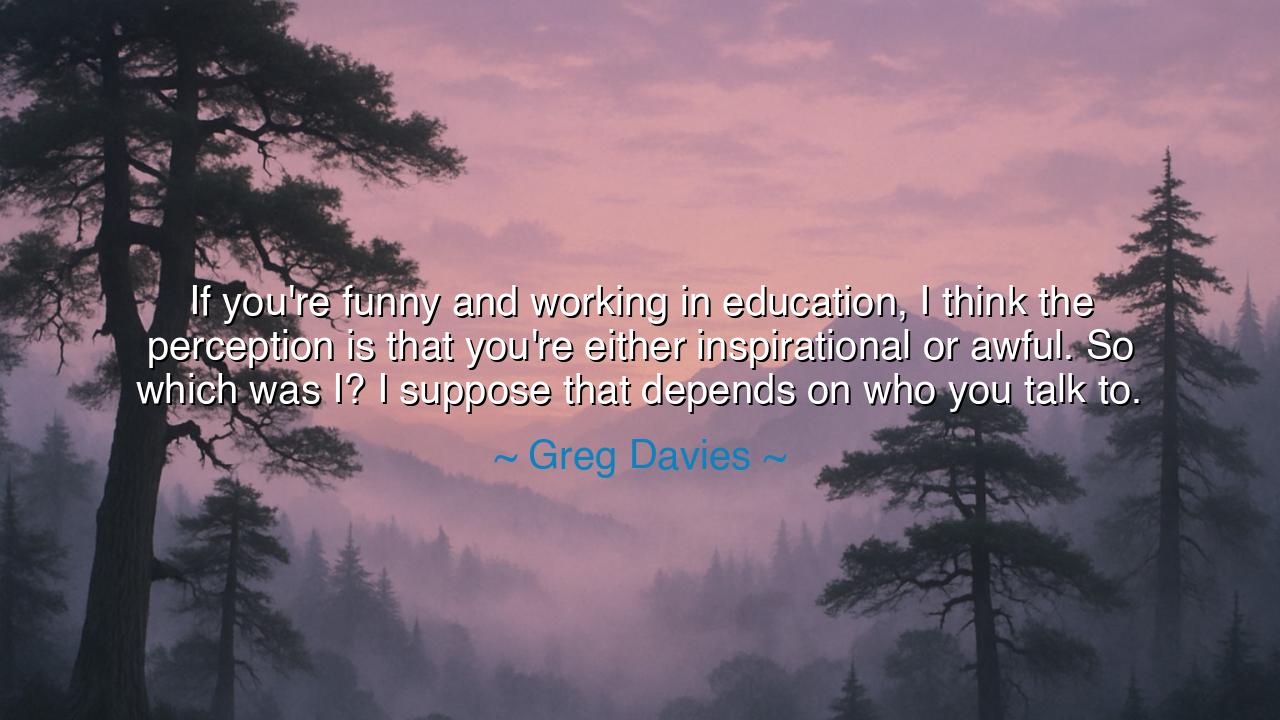
If you're funny and working in education, I think the perception
If you're funny and working in education, I think the perception is that you're either inspirational or awful. So which was I? I suppose that depends on who you talk to.






In the tapestry of human speech, few threads gleam brighter than the truth wrapped in humor. When Greg Davies declared, “If you're funny and working in education, I think the perception is that you're either inspirational or awful. So which was I? I suppose that depends on who you talk to,” he spoke not merely as a comedian, but as a philosopher disguised in laughter. His words unveil the eternal tension between seriousness and levity, between those who teach through gravity and those who teach through joy. In that balance lies one of the oldest questions of wisdom: can laughter instruct as powerfully as solemnity?
The ancients, too, pondered this mystery. The philosophers of Athens knew that jest and truth often walked hand in hand. Diogenes, the Cynic, wielded humor as a blade of revelation — mocking kings and thinkers alike, yet forcing all who heard him to confront their own follies. He was called both “madman” and “sage,” both “inspirational” and “awful.” So it is with all who dare to mix laughter with wisdom: the crowd will divide. Some will see light; others will see irreverence. Yet, both are reflections of the same flame.
In the realm of education, the burden is even greater. The teacher who laughs is often misjudged — thought frivolous by the stern, yet adored by the young who understand that joy is not the enemy of discipline, but its companion. Greg Davies, before fame found him, was a teacher who understood that humor awakens the weary mind. For in laughter, the heart opens, and in that opening, truth can take root. But not all soil is ready for such planting. To some, laughter in the classroom is rebellion; to others, it is revelation. Thus, perception divides — and truth is born from contrast.
Consider Socrates, who taught through irony and questioning, often provoking his students to laughter before leading them into the depths of reflection. Many called him dangerous, even corrupting. Yet his laughter concealed a deeper purpose — to unsettle, to awaken, to make the soul see what solemnity could not. So too did Greg Davies’s humor mask a wisdom beyond mere jest. To be funny in a world that takes itself too seriously is to wage war with despair, to defy the dull weight of convention, and to remind humanity that even truth can smile.
But the question lingers — “So which was I?” The answer, as Greg suggests, lies not in self-judgment, but in the eyes of the beholder. For no human being is seen alike by all. The saint to one may be a heretic to another. The teacher who inspires one student to dream may irritate another into scorn. This is the paradox of all who create — to be loved and misunderstood in equal measure. The wise accept this duality not as curse, but as proof of life’s rich complexity.
From this reflection, a lesson arises: do not fear contradiction in your calling. If your work stirs both admiration and discomfort, then you are alive in the truest sense. To seek only praise is to wither in mediocrity. As Greg’s words remind us, perception is a mirror, not a truth — and every mirror distorts. The teacher, the artist, the leader must walk the middle path between approval and rejection, guided not by applause but by purpose.
Therefore, to those who teach, create, or lead — be unafraid to be both funny and profound, both light and serious. Let your laughter carry lessons; let your lessons carry warmth. Do not bend to the narrow gaze of those who confuse solemnity with wisdom. Instead, embody the spirit of those like Diogenes, Socrates, and Greg Davies — souls who dared to show that humor, when wielded with heart, is not mockery but illumination.
For in the end, the greatest teachers do not divide the world into inspirational or awful — they invite it to think, to feel, and to grow. And that, dear listener, is no small laughter; it is the sound of wisdom breathing.






AAdministratorAdministrator
Welcome, honored guests. Please leave a comment, we will respond soon